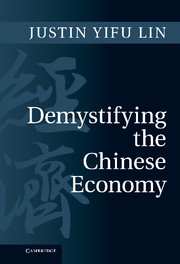Book contents
- Frontmatter
- Contents
- List of figures
- List of tables
- Preface
- 1 Opportunities and challenges in China's economic development
- 2 Why the Scientfic and Industrial Revolutions bypassed China
- 3 The great humiliation and the Socialist Revolution
- 4 The comparative advantage-defying, catching-up strategy and the traditional economic system
- 5 Enterprise viability and factor endowments
- 6 The comparative advantage-following development strategy
- 7 Rural reform and the three rural issues
- 8 Urban reform and the remaining issues
- 9 Reforming the state-owned enterprises
- 10 The financial reforms
- 11 Deflationary expansion and building a new socialist countryside
- 12 Improving the market system and promoting fairness and efficiency for harmonious development
- 13 Relflections on neoclassical theories
- Appendix Global imbalances, reserve currency, and global economic governance
- Index
10 - The financial reforms
Published online by Cambridge University Press: 05 June 2014
- Frontmatter
- Contents
- List of figures
- List of tables
- Preface
- 1 Opportunities and challenges in China's economic development
- 2 Why the Scientfic and Industrial Revolutions bypassed China
- 3 The great humiliation and the Socialist Revolution
- 4 The comparative advantage-defying, catching-up strategy and the traditional economic system
- 5 Enterprise viability and factor endowments
- 6 The comparative advantage-following development strategy
- 7 Rural reform and the three rural issues
- 8 Urban reform and the remaining issues
- 9 Reforming the state-owned enterprises
- 10 The financial reforms
- 11 Deflationary expansion and building a new socialist countryside
- 12 Improving the market system and promoting fairness and efficiency for harmonious development
- 13 Relflections on neoclassical theories
- Appendix Global imbalances, reserve currency, and global economic governance
- Index
Summary
The sustainability of a country's economic development hinges on its potential and capacity for continuous technological innovation. But technological innovation is not a free lunch, it needs capital.
Developing economies have two ways to innovate. One is R&D, costly and risky, with a slim chance of success. The other is technological adoption, but the new technology is usually embodied in new machinery and equipment, which has to be purchased. So additional capital is needed. In short, both R&D and technological adoption need a lot of capital.
In the modern economy the financial sector is important for financing and for risk-sharing. If the financial sector is inefficient, technological innovation suffers, and the economy is bound to stagnate or even encounter crisis. That is why, without a modern financial sector, there will be no modern national economy.
In Chapter 9 I mentioned that the financial sector is fraught with problems, especially a high ratio of non-performing loans and the speculation and “bubbles” in the stock market. These problems can be alleviated when the innate problems of SOE s are addressed. But the financial sector still has an irrational structure. The ratio of direct financing to indirect financing is low. Direct financing refers to financing through the stock market and indirect financing refers to financing through banks and other financial intermediaries. And the ratio of large banks to small and medium banks in the indirect financing is high.
- Type
- Chapter
- Information
- Demystifying the Chinese Economy , pp. 207 - 221Publisher: Cambridge University PressPrint publication year: 2011



